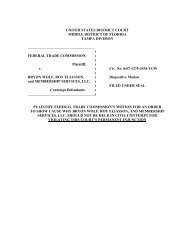Complaint Counsel's Post Trial Brief - Federal Trade Commission
Complaint Counsel's Post Trial Brief - Federal Trade Commission
Complaint Counsel's Post Trial Brief - Federal Trade Commission
Create successful ePaper yourself
Turn your PDF publications into a flip-book with our unique Google optimized e-Paper software.
not cure the fact that the claims are not substantiated." Dietary Supplements Guide at 24<br />
(quoting "Example 34").<br />
B. Respondents' Representations That The DCO Products Prevent, Treat, or<br />
Cure Cancer Are Misleading<br />
1. Unsubstantiated Claims Are Misleadig<br />
The Commssion may prove an adverisement is deceptive or misleading by showing that<br />
an express or implied claim is false, or by showing that a clai is unsubstantiated because<br />
Respondents lacked a reasonable basis for assering that the clai was tre. FTC v. Pantron I<br />
Corp., 33 F.3d 1088, 1096 (9th Cir. 1994); FTC v. Sabal, 32 F. Supp. 2d 1004, 1007 (N.D. ilL.<br />
1998). Proof of intent to deceive is not required, and ''te subjective good faith of the adverser<br />
is not a valid defense to an enforcement action brought under section 5(a)." Sabal, 32 F. at<br />
1007; see also FTC v. World Travel Vacation Brolærs, Inc., 861 F.2d 1020, 1029 (7th Cir. 1988).<br />
The "reasonable basis" test is an objective standard. Adverisers must possess at least the<br />
level of substantiation expressly or impliedly claied in the adverisement. See Honeywell, Inc.,<br />
126 F.T.C. 202 (1998); FTC v. Natural Solution, Inc., No. CV 06-6112-JFW, 2007 U.S. Dist.<br />
LEXIS 60783, at *10 (C.D. Cal. Aug. 7,2007) (citing FTC<br />
v. U.S. Sales Corp., 785 F. Supp.<br />
737, 748 (N.D. ilL. 1992)). The Commssion has the burden of provig that Respondents'<br />
purorted substantiation is inadequate, but is not required to conduct or present clincal studies<br />
showing that the products do not perorm as claimed. See FTC v. QT, Inc., 448 F. Supp. 2d 908,<br />
959 (N.D. ilL. 2006) ajfd 512 F.3d 858 (7th Cir. 2008), (citing Sabal, 32 F. Supp. 2d at 1008-09).<br />
For health and safety claims, adverisers must possess "competent and reliable scientific<br />
evidence" substantiating their claims in order to have a "reasonable basis" for such claims. See<br />
FTCv. National Urological Group, Inc., No. 1:04-CV-3294-CAP, 2008 U.S. Dist. LEXIS<br />
21

















